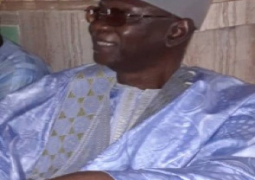
To keep up with the necessary periodical maintenance at the Edward Francis Small Teaching Hospital (EFSTH) admissions wards are supported by corporate institutions. Thus we find the Petrogas- Medical Ward and the 1st Lady Fund- Obstetrics Unit. These innovations contribute significantly in reducing mortality but still greater results could be achieved if both patient and individual health care providers are rewarded.
The Morgue however, benefited little from such initiatives and the name remains unchanged- the ‘Mortuary or Dead House’. It is on record that GAMTEL had installed some useful equipment. Recently, this mortuary at the EFSTH had a remarkable upgrading that would facilitate sanitary operation. The work was undertaken by Gambian philanthropies living abroad and should be encouraged and provided with greater space for continuous support.
During the renovation activities, a refrigerated container was noted to be holding about 40 corpses. It is known that hospitals quite often provide pathological services for the determination of causes of death; such will provide vital information for public health planning. Corpses are retained until complete investigations can be done. It is also necessary to hold deceased bodies suspected of foul play to allow for legal course of actions. It was not only the presence of human bodies in a refrigerated container that was worrying but their very long period of retention (5 to 10 years). The bodies are under refrigeration and therefore pose little or no public health hazard.It is important not to underestimate the cost of maintaining such storage facilities and also not to ignore the denial of proper storage to situations that really demand for it. The operation of the morgue should stipulate the maximum period a corpse could be retained in the mortuary. The public should be well informed of this policy and continuous reminder be given to any person or institution that brings in a corpse.
The potential public health hazards, the rising cost of refrigeration and the occupied space justify the questioning that circulates amongst the public. It is a human behavour particularly Gambian, to show respect and dignity to any human remains or body parts.
Whatever is the original cause of this pathetic situation at the mortuary, concerned authorities including the Hospital Operations and Management Board, Ministry of Health and Police are engaged in finding a solution. Arriving at an acceptable solution demands careful consideration of; legal processes, public health and socio-cultural norms. Opportunities should be given to family members to verify identifiable corpses. The minimum religious rites (Muslim and Christianity) be allowed and facilitated. It is reasonable to envisage mass burial but there should be a public announcement of the place date and time of mass funeral. Some members of the public would like to perform ‘works of mercy’ be attending to funeral and offering prayers for either known or unknown persons.
Read Other Articles In Opinion





